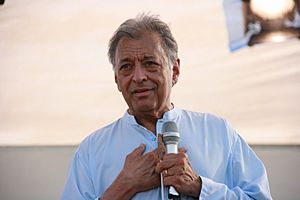Zubin Mehta facts for kids
Quick facts for kids
Zubin Mehta
|
|
|---|---|
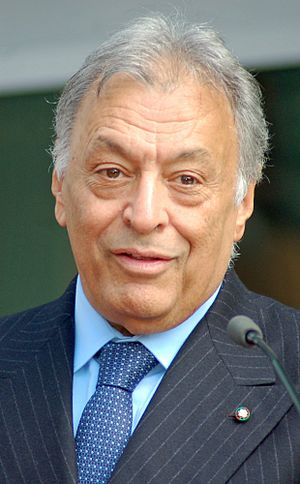
Mehta in 2011.
|
|
| Born | 29 April 1936 |
| Occupation | Conductor |
| Years active | 1958–present |
| Known for | Directing and conducting: Montreal Symphony Orchestra; Los Angeles Philharmonic; New York Philharmonic; Israel Philharmonic Orchestra |
| Spouse(s) |
Carmen Lasky
(m. 1958; div. 1964)Nancy Kovack
(m. 1969) |
| Children | 4 |
| Parent(s) |
|
| Relatives | Zarin Mehta (brother) Bejun Mehta (distant relative) |
Zubin Mehta (born 29 April 1936) is a famous Indian conductor of classical music. He is known for leading many top orchestras around the world. He is now the music director emeritus (a special honorary title) of the Israel Philharmonic Orchestra (IPO). He also holds the same title with the Los Angeles Philharmonic.
Zubin Mehta's father started the Bombay Symphony Orchestra. Zubin learned music from his father from a young age. When he was 18, he went to the Vienna state music academy to study conducting. He finished his studies in three years. He quickly started winning international music competitions. At just 21, he conducted the Royal Liverpool Philharmonic. In the 1960s, Mehta became well-known by filling in for famous conductors worldwide.
Mehta was the music director for the Montreal Symphony Orchestra from 1961 to 1967. He also led the Los Angeles Philharmonic from 1962 to 1978. He was the youngest music director for any major North American orchestra. In 1969, he became a Music Adviser to the Israel Philharmonic Orchestra. By 1981, he was named its Music Director for Life. From 1978 to 1991, Mehta was the music director of the New York Philharmonic. He also led the Maggio Musicale Fiorentino in Florence from 1985 to 2017.
He has received many honors. He is an honorary citizen of Florence and Tel Aviv. He became an honorary member of the Vienna State Opera in 1997. In 2006, he was made an honorary member of the Bavarian State Opera. Many orchestras around the world have given him the title of Honorary Conductor. In December 2006, he received the Kennedy Center Honor in the U.S. In October 2008, Japan's Imperial Family honored him with the Praemium Imperiale. In 2016, Mehta was named Honorary Conductor of the Teatro San Carlo in Naples, Italy.
Contents
Early Life and Music Education
Zubin Mehta was born in Bombay (now Mumbai), India. His family was Parsi. His father, Mehli Mehta, was a violinist who taught himself. He started and conducted the Bombay Symphony Orchestra. Later, he led the American Youth Symphony in Los Angeles for 33 years. Zubin's father had studied violin in New York. Zubin often heard his father's music at home. He said he learned to speak his native language, Gujarati, and sing around the same time.
Zubin's father taught him to play the violin and piano first. When Zubin was a teenager, his father let him lead parts of the Bombay Symphony rehearsals. By age sixteen, he was conducting the full orchestra during practice.
Mehta finished school at St. Mary's School, Mumbai. His mother wanted him to become a doctor, so he studied medicine for two years. But at 18, he left to study music in Vienna, Austria. Vienna is a famous city for music. He studied conducting at the state music academy. He lived on a small budget. Other famous conductors like Claudio Abbado and Daniel Barenboim were also studying there at the same time.
He studied at the academy for three years. During this time, he also learned to play the double bass. He played it in the Vienna Chamber Orchestra. His teacher, Hans Swarowsky, saw Zubin's talent early on. In 1956, while still a student, Zubin quickly put together a student orchestra. They performed a concert for refugees outside Vienna.
Mehta graduated in 1957 when he was 21. In 1958, he won first prize in the Liverpool International Conductor's Competition. This prize gave him a one-year contract as an associate conductor with the Royal Liverpool Philharmonic. He conducted 14 concerts, and they all received great reviews.
Later, he won third prize at the Tanglewood Music Center in Massachusetts. There, Charles Munch, the conductor of the Boston Symphony, noticed him. Munch later helped Mehta's career. In 1958, Mehta bravely planned a concert featuring only music by Schoenberg, which was very successful. That same year, he married Carmen Lasky, a Canadian voice student he met in Vienna.
Conducting Career Highlights
Early Successes in the 1960s
In 1960 and 1961, Mehta was asked to step in for famous conductors around the world. He received high praise for most of these performances. In 1960, he conducted for the Vienna Symphony. Later that summer, he made his New York debut leading the New York Philharmonic.
In 1960, with help from Charles Munch, Mehta became the chief conductor and Music Director of the Montreal Symphony Orchestra. He held this position until 1967. By 1961, he had already conducted the Vienna, Berlin, and Israel Philharmonic orchestras. In 1962, he took the Montreal Symphony on a tour to Russia, Paris, and Vienna. His concert in Vienna received a 20-minute standing ovation.
In 1961, he was named assistant conductor of the Los Angeles Philharmonic (LAP). The orchestra had not had a permanent conductor for four years when Mehta started.
Mehta became the Music Director of the Los Angeles Philharmonic from 1962 to 1978. When he started in 1962, he was only 26. This made him the youngest person ever to hold that title. Since he also conducted the Montreal Symphony during these years, he was the first person to lead two North American symphony orchestras at the same time.
As the LAP's first conductor in four years, Mehta worked to improve its sound. He made it warmer and richer by encouraging musicians and changing seating. Cellist Jacqueline du Pré said, "He provides a magic carpet for you to float on." Another cellist, Kurt Reher, remembered Mehta's first rehearsal: "within two beats we were entranced."
In 1965, Mehta conducted the Metropolitan Opera's performance of Aida. A music critic wrote that Mehta brought a "bedazzlement" to the conducting. He later conducted other operas like Carmen, Tosca, and Turandot at the Met.
For Montreal's Expo 67, he conducted both the Montreal and Los Angeles orchestras together. They performed Berlioz's Symphonie fantastique. Also that year, Mehta conducted the first performance of Marvin David Levy's Mourning Becomes Electra.
By May 1967, his schedule was too busy, so he left his Montreal job. That fall, he took the Los Angeles Philharmonic on an eight-week tour. This included concerts in Vienna, Paris, Athens, and Bombay. By 1968, he was even busier. Time magazine featured him on its cover in January 1968.
In 1970, Mehta performed with Frank Zappa's Mothers of Invention at UCLA's Pauley Pavilion. They played Zappa's "200 Motels" and Edgar Varese's "Intergrales" for 12,000 people.
Leading Major Orchestras: 1970s–1980s
In 1978, Mehta became the Music Director and Principal Conductor of the New York Philharmonic. He stayed there until 1991.
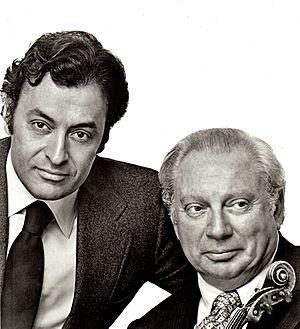
He became music director of the Israel Philharmonic Orchestra (IPO) in 1977. He first conducted the IPO as a guest in 1961. In 1966, he toured with the orchestra. During the 1967 Arab–Israeli war, he quickly returned to Israel to conduct special concerts. These showed his support for the people. He was named IPO's Music Advisor in 1969, Music Director in 1977, and Music Director for Life in 1981.
Over five decades, he conducted the IPO in thousands of concerts in Israel and other countries. He led concerts with the IPO in South Lebanon in 1982. He also conducted during the Gulf War in 1991, when the audience wore gas masks. In 2007, the orchestra played for an all-Arab audience in Nazareth. He feels a strong connection to Israel's musicians and people. He says conducting the IPO is "something I do for my heart."
In 1978, Mehta left the Los Angeles Philharmonic to lead the New York Philharmonic (NYP). He wanted to try new ideas, like taking the orchestra to Harlem. They played at the Abyssinian Baptist Church every year. Famous musicians like Isaac Stern, Itzhak Perlman, and Kathleen Battle performed with the orchestra. He stayed with the NYP until 1991.
From 1985 to 2017, Mehta was the chief conductor of the Teatro del Maggio Musicale Fiorentino in Florence. From 1998 until 2006, he was music director of the Bavarian State Opera in Munich. The Munich Philharmonic named him its Honorary Conductor. Since 2005, Mehta has been the main conductor of the Palau de les Arts in Valencia, Spain.
While leading the New York Philharmonic, Mehta asked Ravi Shankar to compose his Concerto No. 2 for sitar and orchestra. After performances in New York, the concerto was recorded with the London Philharmonic Orchestra.
Notable Performances: 1990s and Beyond
In 1998, he moved to Munich to direct the Bavarian State Opera. He said it gave him "another panorama" to be involved in running an opera house.
In 1990, he conducted the Orchestra del Maggio Musicale Fiorentino and the Orchestra del Teatro dell'Opera di Roma. This was for the first ever Three Tenors concert in Rome. He joined the tenors again in 1994 in Los Angeles. In 1992, he conducted a historic production of Tosca. Each act took place in the actual setting and time mentioned in the music.
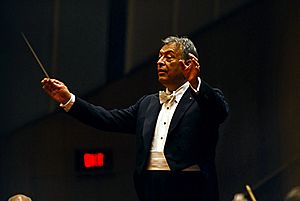
In June 1994, Mehta performed the Mozart Requiem with the Sarajevo Symphony Orchestra and Chorus. This was at the ruins of Sarajevo's National Library. It was a concert to raise money for victims of war. On 29 August 1999, he conducted Mahler's Symphony No. 2 (Resurrection). This was near the Buchenwald concentration camp in Weimar. The Bavarian State Orchestra and the Israel Philharmonic Orchestra played together.
He toured India (Mumbai) in 1984 with the New York Philharmonic. He returned in 1994 with the Israel Philharmonic Orchestra. In 1997 and 1998, Mehta worked with Chinese film director Zhang Yimou. They created a production of Giacomo Puccini's opera Turandot. They took it to Florence and then to Beijing. In Beijing, it was performed in the Forbidden City. This involved over 300 extras and 300 soldiers for nine historic shows. A documentary called The Turandot Project was made about this production.
Mehta was also a guest conductor for the American Russian Young Artists Orchestra.
On 26 December 2005, the first anniversary of the Indian Ocean tsunami, Mehta and the Bavarian State Orchestra performed in Chennai (formerly Madras). This concert honored tsunami victims. 2006 was his last year with the Bavarian State Orchestra.
In 2011, Mehta's performance with the Israel Philharmonic Orchestra in London was interrupted by protesters. This caused the BBC to stop the live radio broadcast. In September 2013, Mehta performed with the Bavarian State Orchestra in Srinagar, India. This special concert was organized by the German Embassy. Mehta and the orchestra did not charge their usual fees for this concert.
In October 2015, he returned to Chennai to perform with the Australian World Orchestra (AWO). In 2016, the Harbin Symphony Orchestra and the Israel Philharmonic Orchestra performed two concerts led by Mehta in China.
In December 2016, the Israel Philharmonic announced that Mehta would finish his time as music director in October 2019. He now holds the title of music director emeritus of the Israel Philharmonic.
In August 2022, Mehta conducted the Australian World Orchestra (AWO) in Sydney and Melbourne. He also led the AWO at the Edinburgh International Festival and the BBC Proms 2022.
Personal Life
Mehta's first marriage was to Carmen Lasky in 1958. They had a son, Mervon, and a daughter, Zarina. They divorced in 1964. In July 1969, Mehta married Nancy Kovack, an American actress. Mehta lives in the United States but is still an Indian citizen.
One of his close friends was Ravi Shankar, a famous sitar player. They first met in the 1960s. Their friendship continued when they both lived in Los Angeles and later in New York.
Honors and Awards
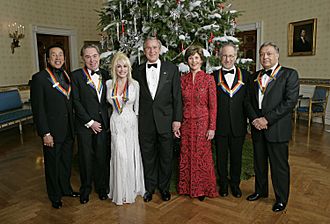
- In 1965, he received an honorary doctorate from Concordia University.
- Mehta's name is mentioned in the song "Billy the Mountain" by Frank Zappa and The Mothers of Invention.
- At the Israel Prize ceremony in 1991, Mehta received a special prize. This was for his dedication to Israel and the Israel Philharmonic Orchestra. In 1995, he won the Wolf Prize in Arts. In 1999, the United Nations gave him the "Lifetime Achievement Peace and Tolerance Award."
- The Government of India honored Mehta with the Padma Bhushan in 1966. In 2001, he received India's second highest civilian award, the Padma Vibhushan.
- In September 2006, Mehta was named a recipient of the Kennedy Center Honors.
- In February 2007, he received the Second Annual Bridgebuilder Award.
- Mehta is an honorary citizen of Florence and Tel Aviv. He became an honorary member of the Vienna State Opera in 1997. In 2001, he was named "Honorary Conductor" of the Vienna Philharmonic. In 2004, the Munich Philharmonic gave him the same title. The Los Angeles Philharmonic and the Teatro del Maggio Musicale Fiorentino also honored him in 2006.
- In 2007, Mehta received the prestigious Dan David Prize.
- In October 2008, Mehta received the Praemium Imperiale from Japan.
- In March 2011, Mehta received the 2,434th star on the Hollywood Walk of Fame. In October 2011, he received the Echo Klassik award in Berlin for his life's work.
- In September 2013, the President of India, Pranab Mukherjee, gave him the Tagore Award 2013. This was for his great work in promoting cultural harmony.
- In January 2019, the Los Angeles Philharmonic named Mehta as their Conductor Emeritus.
- In February 2019, the Berlin Philharmonic made Mehta an honorary member.
- In September 2019, the President of Slovenia gave Zubin Mehta the Golden Order of Merit. This was for his contribution to music and connecting people through art.
- In November 2020, the World Jewish Congress gave Mehta their fifth Teddy Kollek Award.
- In September 2022, he was appointed an Honorary Companion of the Order of Australia. This was for his service to the relationship between Australia and India, and for his work in classical music and helping others.
Films Featuring Zubin Mehta
Mehta's life was shown in Terry Sanders's film Portrait of Zubin Mehta (1968). Another film, Zubin and I, was made by the grandson of an Israeli harpist. This film follows the orchestra on a tour of Mumbai.
In Christopher Nupen's 1969 film The Trout, Mehta plays the double bass. This film is about a performance of Schubert's Trout Quintet.
Mehta and the Los Angeles Philharmonic are featured in Alan Miller's 1973 film The Bolero.
Mehta also played himself in On Wings of Fire, a 1986 film about the history of Zoroastrianism.
Zubin Mehta: In Rehearsal (1996) shows Mehta rehearsing Till Eulenspiegel's Merry Pranks with the Israel Philharmonic.
Mehta and his orchestra are in the 2017 Spanish film Dancing Beethoven. This film shows the preparation of the Ninth Symphony.
Music Education Projects
In 2009, Mehta started Mifneh (which means "change" in Hebrew). This is a music education program for Israeli Arabs. Three schools are part of this project.
He and his brother Zarin are on the Advisor Council of the Mehli Mehta Foundation.
In 2005, Mehta and Josef Buchmann started the Buchmann-Mehta School of Music. This school is a partnership between Tel Aviv University and the Israel Philharmonic Orchestra. Mehta is the school's honorary president and is still very involved.
See also
 In Spanish: Zubin Mehta para niños
In Spanish: Zubin Mehta para niños
 | Tommie Smith |
 | Simone Manuel |
 | Shani Davis |
 | Simone Biles |
 | Alice Coachman |


